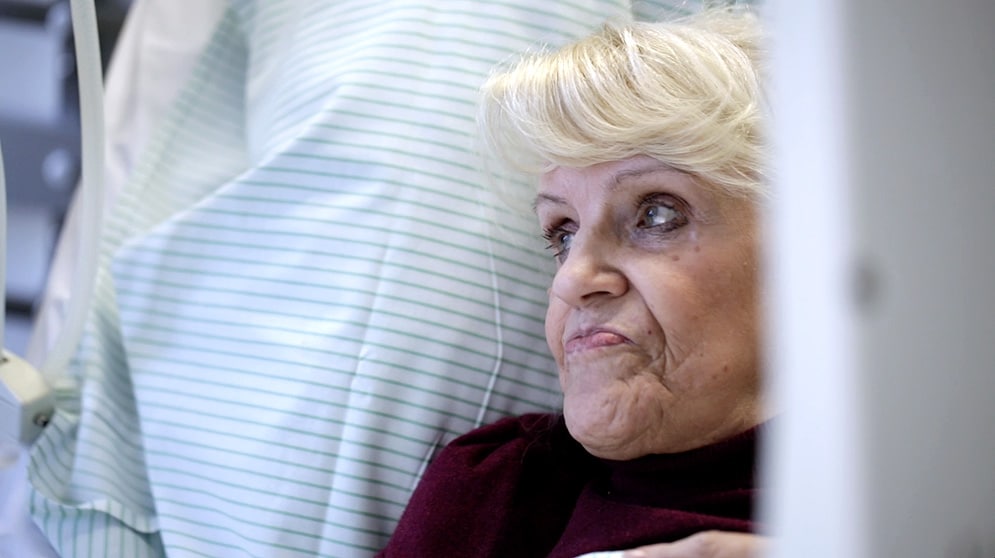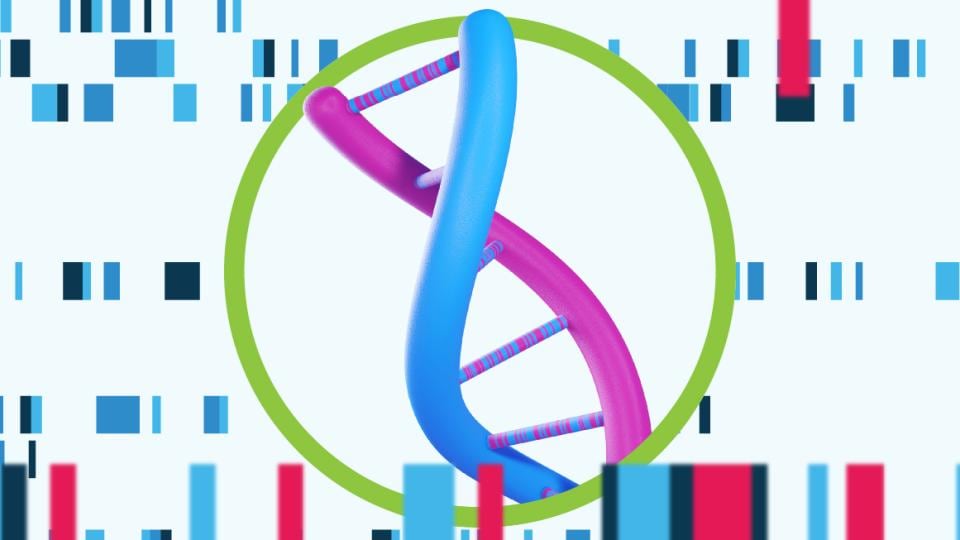Living with Anemia

Maya Hügle has to go to hospital regularly for hemodialysis.
Since her youth, Maya Hügle has suffered from anemia. Even today, the disease continues to define how she lives her everyday life – with frequent injections and recurring episodes of exhaustion. Pharmaceutical research companies like Bayer are therefore searching for ways to improve treatment for people like Maya.
Maya Hügle used to have a different life. One with dreams, hopes, and plans for the future. One in which she would become a researcher and discover a medicine to treat her father, who suffered from lung disease. One with a first great love, secret parties and a traineeship as a doctor’s assistant in a medical practice in Düren, close to her hometown. “Back then, I had everything that a young woman could wish for,” she says. “I was bursting with energy and lust for life.”
Now 59, Maya is happy to share her story. She wants to educate others. For the last forty years, Maya has suffered from anemia, a serious side-effect of her renal impairment. Her kidneys no longer produce sufficient erythropoietin (EPO), a crucial growth factor in the formation of red blood cells. In healthy humans, EPO regulates the production of red blood cells in the bone marrow, depending on the oxygen content of the blood. These red blood cells contain hemoglobin, also known as Hb. This iron-rich protein binds oxygen, which is then distributed to the organs via the circulatory system. If enough oxygen is present, only a little EPO is needed. And in people with healthy kidneys, if the oxygen level drops, more EPO is produced.

For Maya Hügle, this cycle is broken. When she was still a trainee, she often suffered severe headaches and was quick to grow tired and exhausted. “That was because my heart had to pump much harder to transport enough oxygen to the organs – there just weren’t enough red blood cells to do the job,” she explains. But the doctors failed to recognize the true nature of her illness. “They prescribed headache tablets and said the causes were psychological.” At the time, the 19-year-old was confused, and convinced that she was putting herself under too much pressure by doing extra training to become a laboratory assistant. Until the fateful summer holiday when she went to the Franconian Forest in Bavaria with her mother: From one moment to the next, she collapsed.
Since her diagnosis, the disease has dominated Maya Hügle’s life. Anemia sufferers have to have regular injections of genetically engineered EPO, a therapy that has been in place since the 1980s. Over the course of several weeks, the injections gradually increase Maya’s Hb count. Even when her Hb value is high enough, she still has to go in frequently for check-ups and to get regular injections to maintain this count. Currently, administering genetically engineered EPO is the only possibility for treating the EPO deficiency of patients with kidney disease.

University clinics, medical institutes and leading pharmaceutical companies like Bayer want to help those suffering from the disease. Because the current therapies conceal health risks. “The EPO injections significantly increase the production of red blood cells; however, as shown in major studies in which EPO was used, completely correcting the anemia to the same values as healthy people was associated with increased cardiovascular risk,” explains Thilo Krüger, an expert on kidney diseases at Bayer. “As a result of this increased risk, guidelines and EPO manufacturers currently restrict the complete correction of anemia.”

The researchers are therefore focusing on alternative therapy options to reduce this risk. The aim is to develop treatment methods that normalize the body’s own EPO production, and thus minimize both the required effort and risk for the patients. Bayer is working on exactly this with Professor Iain Macdougall. Every day, at King’s College in London, the internationally renowned kidney researcher sees just how seriously anemia causes his patients to suffer. “They feel tired and weak, they have problems walking, and they suffer from impaired memory and concentration issues,” he explains. “It all adds up to very low quality of life, and that, in turn, can intensify depression and mood swings.”
For this reason, researchers are currently testing the advantages offered by a new tablet-based therapy that stimulates the body’s own production of EPO in the kidneys. The hope is that “we can come to grips with the problems posed by high-risk peak values and the rapid fall-off of the Hb count,” says Iain Macdougall. “Patients will only have to take a single tablet regularly to maintain their blood values at a good level.” That would be a big benefit for anemia patients because they would no longer have to keep having injections.
Possible Signs of Anemia
The signs of anemia are not always clear. The duration and the severity of the disease have a big influence. Therefore the symptoms caused by a lack of oxygen differ from patient to patient – both in the kind of symptoms as well as their severity. They can include:
- trouble concentrating and tiredness
- reduced physical ability to cope with pressure
- headache and sickness
- dizziness
- pounding in the ears and tinnitus
- visual disorders
- shortness of breath
- heart palpitation pale skin, conjunctiva and mucosa
For Maya Hügle, any small step taken by the researchers would make her life easier. Although she has learned to live with the disease, for decades her daily life has been organized around regular visits to the doctor. “Every day since I was diagnosed, I’ve felt as if someone has taken my life away from me.” The treatments meant that she had to give up her additional training.
Until the advent of genetically engineered EPO in the 1980s, Maya needed frequent blood transfusions. The disease took a heavy toll on her family, too: “Everything revolved around my treatment, and my mother constantly had to drive me to hospital,” she explains. In her free time, suddenly, she often found herself left out. Gossip spread in her hometown, and friends began avoiding her. “They thought I was contagious.”
Today, treatment for anemia has improved greatly and people are generally more aware of the disease and its symptoms. Maya Hügle’s own educational efforts have contributed to this. As section head of a kidney association in Germany, the Interessengemeinschaft Niere NRW Neuss e.V., she voluntarily provides advice twice a week to those affected by the disease. “Sometimes, young women come in who are around the same age as I was back when I was first diagnosed,” she explains. “I hope that the researchers come up with an even better therapy soon, one that doesn’t determine every aspect of your life. Not for me, but for them, because they still have so much ahead of them. They should not have to give up everything and go through what I do.”




















